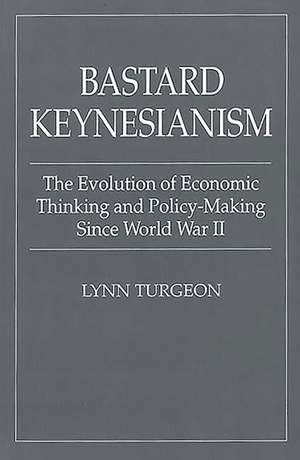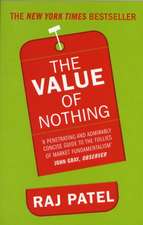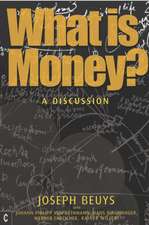Bastard Keynesianism: The Evolution of Economic Thinking and Policy-Making Since World War II
Autor Lynn Turgeonen Limba Engleză Paperback – 21 apr 1997 – vârsta până la 17 ani
Preț: 236.16 lei
Preț vechi: 291.25 lei
-19% Nou
Puncte Express: 354
Preț estimativ în valută:
45.19€ • 48.32$ • 37.68£
45.19€ • 48.32$ • 37.68£
Carte tipărită la comandă
Livrare economică 18 aprilie-02 mai
Preluare comenzi: 021 569.72.76
Specificații
ISBN-13: 9780275960155
ISBN-10: 0275960153
Pagini: 184
Dimensiuni: 156 x 235 x 14 mm
Greutate: 0.28 kg
Ediția:Revised
Editura: Bloomsbury Publishing
Colecția Praeger
Locul publicării:New York, United States
ISBN-10: 0275960153
Pagini: 184
Dimensiuni: 156 x 235 x 14 mm
Greutate: 0.28 kg
Ediția:Revised
Editura: Bloomsbury Publishing
Colecția Praeger
Locul publicării:New York, United States
Notă biografică
LYNN TURGEON is Professor Emeritus of Economics at Hofstra University. He is the author of The Contrasting Economics (1963 and 1969), The Advanced Capitalist System (1980), and State and Discrimination (1989).
Cuprins
PrefaceIntroductionClassical Keynesian ThinkingEconomic Thinking during and after World War IIEisenhower and the Rejection of Military KeynesianismThe Return of Military Keynesianism under Kennedy-JohnsonConversion of President Nixon to Non-Military KeynesianismThe Non-Military Non-Keynesian Ford InterregnumJimmy Carter, the Populist and Military Non-KeynesianMilitary Keynesian and Supply-Side President Ronald ReaganGeorge Bush, Another Non-Military, Non-Keynesian PresidentCan President Clinton Become a Non-Military Keynesian?The Unraveling of Classical Keynesian Economics in the United States over the Past Half-CenturyWhere Do We Go from Here?What Would Keynes Say Today?Appendix A: Development of Keynesianism within the History of Economic DoctrinesAppendix B: What Is Military Keynesianism (and What Is the Alternative)?Appendix C: Thinking about the Partial Devaluation of the DollarAppendix D: Incomes Policies at Home and AbroadAppendix E: How Keynesian Are the Canadians?NotesGlossaryAnnotated Bibliography


















